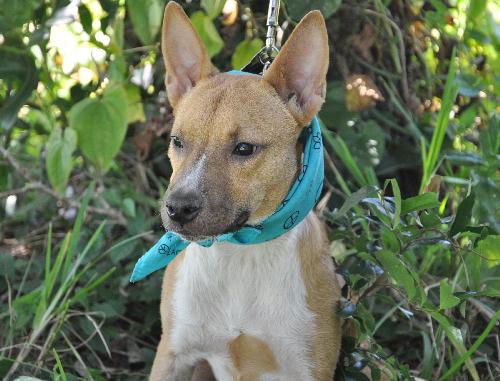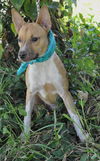
| My Rescue |
| Login to Remember your Favorite Animals and Breeds! |
Zookie came to us from a local animal control when her time was up. She is so cute and loving, won't you consider giving her a new home?
Foster Update: We’ve had Zookie for a little over a week, and we couldn’t love her more. She is a very sweet puppy; she’s sensitive, loving and a bit on the clingy side, which is probably because she’s still somewhat of a new-comer in our home! Although quite the watch dog, she is very friendly to everyone she meets. At first she mainly picked toys out of our vast toy box and played with them on her dog bed, but now she is showing an interest in playing with one of our other dogs. She plays a bit too rough for him, though, so we’re trying to teach her “play nice.” She also has a tendency to play bite, but we’re working on teaching her that that is unacceptable behavior. We’ve also caught Zookie making off with a shoe or two as well as chewing on other items around the house, so that’s a work in progress as well. However, the important thing to remember is that Zookie is still a “puppy” and is still learning. She is easily corrected with a stern NO. Zookie sleeps all night through on a dog bed next to our bed. Zookie goes right outside to do her business, but we continue to reinforce the house training. Zookie stays in her crate when no one is at home, and she doesn’t appear to mind spending time in the crate. All we have to do when we get ready to leave home is show her a “treat,” and she runs right to her crate. However, when you enter the front door, you had best be ready to head straight to her cage to let her out … because she can’t wait to shower you with love to show you how much she missed you! Zookie would make a wonderful addition to any family looking to add another dog. She not only gets along well with other dogs, but she loves children … and people of any age or gender. She also gets along with cats … matter of fact, she doesn’t pay them much attention at all.
According to www.dogbreedinfo.com, the first traces of a dog similar to the Basenji are found in Egyptian tombs and wall drawings of five thousand years ago. Also called the Congo Dog, it was brought to Europe in 1934. English breeders refined it and exported it all over the world. In Africa, it is used as a guide in the forests, to warn against the approach of dangerous animals, and as a very active pack-hunting dog of small game. The Basenji is alert, affectionate, demanding, energetic and curious. It loves to play and makes a good pet, as long as it is handled regularly from an early age. It is very intelligent, responds well to training with a strong desire to please. They can be reserved with strangers. The Basenji is somewhat aloof, but can also form strong bonds with people. It should not be trusted with non-canine pets. They are usually patient, but do best with older considerate children. The Basenji dislike wet weather. They like to chew, so giving them lots of toys of their own would be a good idea. The breed likes to climb and can easily get over chain wire fences. Basenji are very clever at getting their own way, they succeed less by obstinacy than by charm. It has the unique properties of not barking (it makes a low, liquid ululation instead) and of cleaning itself like a cat. It can be described as speedy, frisky, tireless at play and teasing the owner into play. Their strong desire to play can lead to behavior problems if left alone. Most Basenji problems usually involve a mismatch between owner and pet. The owners mistake the adjective "quiet' to mean inactive instead of noiseless; thus, they become harassed by an active, though relatively silent , dog. They have a life expectancy of 10-12 years.
Other Pictures of Zookie the Basenji-Terrier (click to see larger version):
 92k |
 33.3k |
 82k |
 60.2k |
 43k |
 43.9k |
Copyright © Pet Rescue by Judy





